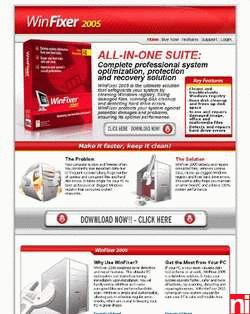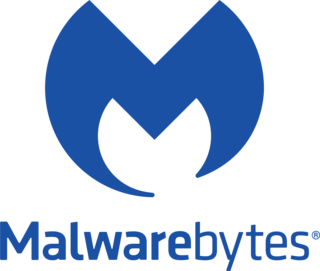Related Research Articles
Adware, often called advertising-supported software by its developers, is software that generates revenue for its developer by automatically generating online advertisements in the user interface of the software or on a screen presented to the user during the installation process. The software may generate two types of revenue: one is for the display of the advertisement and another on a "pay-per-click" basis, if the user clicks on the advertisement. Some advertisements also act as spyware, collecting and reporting data about the user, to be sold or used for targeted advertising or user profiling. The software may implement advertisements in a variety of ways, including a static box display, a banner display, a full screen, a video, a pop-up ad or in some other form. All forms of advertising carry health, ethical, privacy and security risks for users.
Spyware is any software with malicious behavior that aims to gather information about a person or organization and send it to another entity in a way that harms the user by violating their privacy, endangering their device's security, or other means. This behavior may be present in malware and in legitimate software. Websites may engage in spyware behaviors like web tracking. Hardware devices may also be affected.

Scareware is a form of malware which uses social engineering to cause shock, anxiety, or the perception of a threat in order to manipulate users into buying unwanted software. Scareware is part of a class of malicious software that includes rogue security software, ransomware and other scam software that tricks users into believing their computer is infected with a virus, then suggests that they download and pay for fake antivirus software to remove it. Usually the virus is fictional and the software is non-functional or malware itself. According to the Anti-Phishing Working Group, the number of scareware packages in circulation rose from 2,850 to 9,287 in the second half of 2008. In the first half of 2009, the APWG identified a 585% increase in scareware programs.

ESET NOD32 Antivirus, commonly known as NOD32, is an antivirus software package made by the Slovak company ESET. ESET NOD32 Antivirus is sold in two editions, Home Edition and Business Edition. The Business Edition packages add ESET Remote Administrator allowing for server deployment and management, mirroring of threat signature database updates and the ability to install on Microsoft Windows Server operating systems.

Microsoft Defender Antivirus is an antivirus software component of Microsoft Windows. It was first released as a downloadable free anti-spyware program for Windows XP and was shipped with Windows Vista and Windows 7. It has evolved into a full antivirus program, replacing Microsoft Security Essentials in Windows 8 or later versions.

WinFixer was a family of scareware rogue security programs developed by Winsoftware which claimed to repair computer system problems on Microsoft Windows computers if a user purchased the full version of the software. The software was mainly installed without the user's consent. McAfee claimed that "the primary function of the free version appears to be to alarm the user into paying for registration, at least partially based on false or erroneous detections." The program prompted the user to purchase a paid copy of the program.
The Vundo Trojan is either a Trojan horse or a computer worm that is known to cause popups and advertising for rogue antispyware programs, and sporadically other misbehavior including performance degradation and denial of service with some websites including Google and Facebook. It also is used to deliver other malware to its host computers. Later versions include rootkits and ransomware.
Rogue security software is a form of malicious software and internet fraud that misleads users into believing there is a virus on their computer and aims to convince them to pay for a fake malware removal tool that actually installs malware on their computer. It is a form of scareware that manipulates users through fear, and a form of ransomware. Rogue security software has been a serious security threat in desktop computing since 2008. An early example that gained infamy was SpySheriff and its clones, such as Nava Shield.

Security and Maintenance is a component of the Windows NT family of operating systems that monitors the security and maintenance status of the computer. Its monitoring criteria includes optimal operation of antivirus software, personal firewall, as well as the working status of Backup and Restore, Network Access Protection (NAP), User Account Control (UAC), Windows Error Reporting (WER), and Windows Update. It notifies the user of any problem with the monitored criteria, such as when an antivirus program is not up-to-date or is offline.

SpySheriff is malware that disguises itself as anti-spyware software. It attempts to mislead the user with false security alerts, threatening them into buying the program. Like other rogue antiviruses, after producing a list of false threats, it prompts the user to pay to remove them. The software is particularly difficult to remove, since it nests its components in System Restore folders, and also blocks some system management tools. However, SpySheriff can be removed by an experienced user, antivirus software, or by using a rescue disk.

PC Tools, formerly known as WinGuides.com, was a software company acquired by Symantec in 2008; the new owner eventually discontinued the PC Tools name. Company headquarters were in Australia, with offices in Luxembourg, the United States, United Kingdom, Ireland and Ukraine. The company had previously developed and distributed security and optimization software for the Mac OS X and Microsoft Windows platforms.
The Zlob Trojan, identified by some antiviruses as Trojan.Zlob, is a Trojan horse which masquerades as a required video codec in the form of ActiveX. It was first detected in late 2005, but only started gaining attention in mid-2006.
MonaRonaDona is a browser hijacker that uses unique tactics through popups or alert messages stating that you are infected with a virus. It uses this message to send users on a hunt for a MonaRonaDona remedy only to run into other malicious websites.

Malwarebytes is anti-malware software for Microsoft Windows, macOS, ChromeOS, Android, and iOS that finds and removes malware. Made by Malwarebytes Corporation, it was first released in January 2006. This is available in a free version, which scans for and removes malware when started manually, and a paid version, which additionally provides scheduled scans, real-time protection and a flash-memory scanner.
Microsoft Security Essentials (MSE) is a discontinued antivirus software (AV) product that provides protection against different types of malicious software, such as computer viruses, spyware, rootkits, and Trojan horses. Prior to version 4.5, MSE ran on Windows XP, Windows Vista, and Windows 7, but not on Windows 8 and later versions, which have built-in AV components known as Windows Defender. MSE 4.5 and later versions do not run on Windows XP. The license agreement allows home users and small businesses to install and use the product free of charge.

Malwarebytes Inc. is an American Internet security company that specializes in protecting home computers, smartphones, and companies from malware and other threats. It has offices in Santa Clara, California; Clearwater, Florida; Tallinn, Estonia; Bastia Umbra, Italy; and Cork, Ireland.
MS Antivirus is a scareware rogue anti-virus which purports to remove virus infections found on a computer running Microsoft Windows. It attempts to scam the user into purchasing a "full version" of the software. The company and the individuals behind Bakasoftware operated under other different 'company' names, including Innovagest2000, Innovative Marketing Ukraine, Pandora Software, LocusSoftware, etc.
Avira Operations GmbH & Co. KG is a German multinational computer security software company mainly known for its Avira Free Security antivirus software. Although founded in 2006, the Avira antivirus application has been under active development since 1986 through its predecessor company H+BEDV Datentechnik GmbH. Since 2021, Avira has been owned by American software company NortonLifeLock, which also operates Norton, Avast and AVG. It was previously owned by investment firm Investcorp.

Internet Security Essentials, also InternetSecurityEssentials, is rogue security software pretending to protect the computer against malware and viruses. It is one of several clones belonging to the "FakeVimes" family of fake antivirus malware.
References
- ↑ "Beware of FAKE Anti Virus - Winwebsec". DiGiMan. Retrieved November 23, 2012.
- ↑ "Windows Live forum: TROJAN:Win32/Winwebsec-Looks like official Windows Security" . Retrieved November 23, 2012.
- ↑ "Winwebsec". 21 September 2009. Retrieved November 23, 2012.
- ↑ Pohlmann, Norbert. "Screenshot images of the Winwebsec and FakeRean malware families". ResearchGate . Retrieved August 5, 2023.
- ↑ "Rogue:Live Security Platinum". J.Phillips. Retrieved November 23, 2012.
- ↑ "Encyclopedia entry". 2011 Microsoft Corporation. Retrieved November 23, 2012.
- ↑ "Rogue:W32/Winwebsec". F-Secure Corporation. Retrieved November 23, 2012.